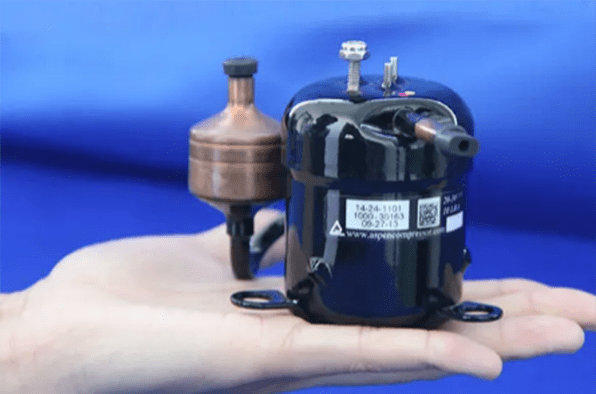
Figure 1: Micro compressor.
The compressor is the core component of the refrigerator. If the fridge compressor doesn't work, the whole fridge won't work either. So what can cause a refrigerator compressor to fail? What are the symptoms of refrigerator compressor failure? What should I do if the refrigerator compressor does not work?
1. What Causes Refrigerator Compressor Failing
1.1 Lack of Oil
Because the compressor lacks oil or there are too many impurities in the oil, the rotor locks the shaft, which causes the motor to burn out and the compressor of the refrigerator to break down.
1.2 Too Much Refrigerant
The refrigerator refrigerant is added too much, which causes the compressor to run overloaded, and finally causes the motor winding coil to burn out.
1.3 Wiring Error
Refrigerator compressor starting coil and running coil are wired incorrectly.
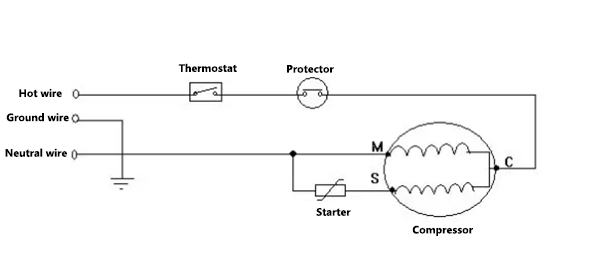
Figure 2: Start-up control system wiring of refrigerator compressor.
S: Starting winding M: Running winding C: Common terminal
1.4 Coil Aging
The coil insulation of the refrigerator compressor is aging.
The causes of compressor failure during use are generally voltage instability (such as caused by a power surge), poor contact of the plug, refrigerant leakage, and damage to the thermistor when the compressor starts.
The main reason why the refrigerator compressor is damaged after maintenance is that the pipeline is not completely evacuated, the compressor is short of oil, or the refrigerant charge is insufficient, the refrigerant charge is too much, the system is dirty or ice blocked!
2. How to Tell if Your Refrigerator Compressor is Bad (Signs)
2.1 Poor Cooling Effect
If the refrigerator compressor is broken, it generally shows that the cooling effect is poor. If the temperature in the refrigerator does not drop or does not change significantly, but the temperature in the freezer drops significantly, it means that the refrigerator compressor is faulty.
2.2 Abnormal Running Sound
If the compressor sounds abnormal (such as a "humming" sound), it indicates that there is something wrong inside the compressor.
1. If there is a rattling sound during operation, it is basically caused by the breakage of the internal suspension spring. In this case, the movement will collide with the casing, and then it will make a rattling sound after being vibrated by the compressor. Professionals are required to open the casing for repair.
2. If there is a hissing sound during operation, it is mainly caused by the breakage of the internal high-pressure output buffer tube. It causes the hissing sound when the compressor is running and exhausting. In this case, it is necessary to ask a professional to replace the high-pressure output buffer tube.
3. If the refrigerator compressor makes a buzzing sound when it is running, and at the same time the starting and running contact jumping sound of "tattling", this sound indicates that the compressor is overloaded. It is necessary to check the power supply system used and adjust the starting contact.
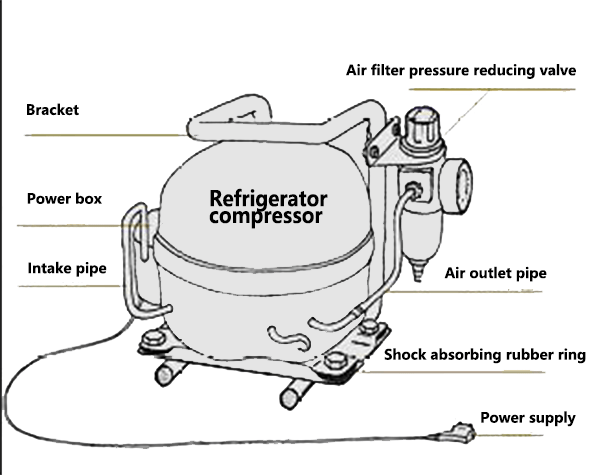
Figure 3: Refrigerator compressor and related accessories diagram.
2.3 High Temperature of Refrigerator
If the temperature of the refrigerator has been in an abnormally high state, then there is also a problem with the compressor, or a failure with other internal components. The specific reason needs to be checked by a professional.
2.4 Vibration Phenomenon
Observe whether there is obvious vibration when the components of the refrigeration system are working, and you can touch the condenser and pipelines and other components to feel whether there is obvious vibration (especially the refrigerator that has been used for a long time).
If it is found that the vibration is relatively serious, accompanied by abnormal noise (usually the noise from the compressor and fan), it is one of the manifestations of compressor damage.
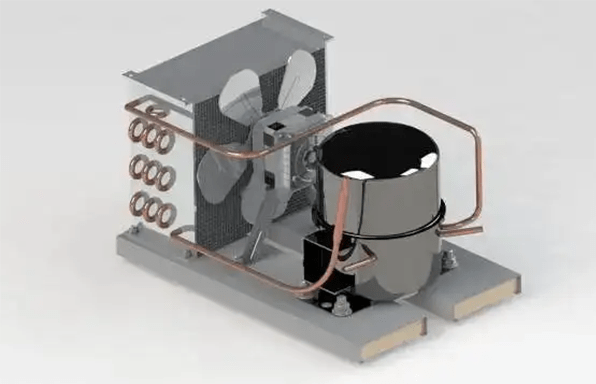
Figure 4: Refrigerator compressor and cooling fan.
It may also be caused by leaks or loose connections in the pipes of the refrigeration system. Under normal circumstances, there should be no vibration when touching the casing of the condenser by hand.
2.5 Use a Multimeter to Measure and Judge
1. Measure the winding: Use the 200 ohm range of the multimeter to measure the wire resistance of the compressor. If the sum of the smaller two measured values in the three groups is equal to the largest measured value, it means that there is no problem.
2. Measure ground resistance: Use a multimeter with a 2 megohm range to measure the direct resistance between the three wires of the compressor and the compressor casing. If the multimeter displays "1.", it means that there is no problem.
3. Measure the thermal protection element: measure the resistance value of the thermal protection element with a multimeter at 200 ohms range, 0-2 ohms displayed are normal.
4. Measure the starting capacitor: use the capacitor gear of the multimeter to measure the capacitor, and if the measured value is close to the marked capacity of the starting capacitor, it is normal.

Figure 5: Component diagram of refrigerator compressor junction box.
3. Refrigerator Compressor Not Working (Causes and Solutions)
3.1 Not Connected to Power Supply
When the refrigerator compressor does not start, first check whether the refrigerator power supply cable is plugged in or whether the refrigerator power supply connection is loose. If the refrigerator is not well connected to the power supply, the refrigerator compressor will of course not start.
Solution: If the problem lies in the power supply, reinsert the power cord of the refrigerator into the power plug to ensure that the refrigerator can fully receive power.
3.2 Compressor Motor Burnt out
The reason why the refrigerator compressor does not start may also be that the motor unit of the compressor is burned, accompanied by the blown fuse of the compressor. This is a common problem that the compressor does not start.
Solution: When the fuse of the refrigerator compressor is blown and the compressor does not start. You need to buy a new fuse and replace the bad one. If the compressor is bad, you need a new one.
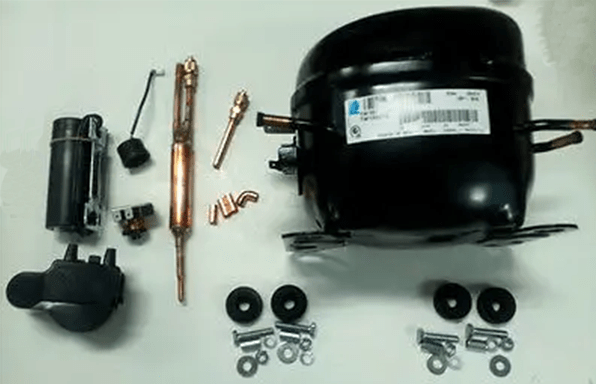
Figure 6: Refrigerator compressor and related accessories.
3.3 Mechanical Failure of Compressor
A mechanical failure of the compressor can also cause the refrigerator compressor not to start. The stuck shaft problem of the compressor is generally caused by the lubricating oil. For example, the lubricating oil passage is blocked or the oil supply is interrupted, and the dirt in the lubricating oil increases its viscosity. The compressor cylinder is stuck due to the gap between the piston and the cylinder is small or the thermal expansion.
Solution: If the lubricating oil is not enough, add lubricating oil. If the viscosity of the lubricating oil increases, replace it. If the problem is that the compressor is stuck, it needs to be repaired by a professional.
3.4 Faulty Controller Circuit
If the control circuit of the refrigerator is faulty, the common phenomena are the overheating, burning, wear of the contacts, which will lead to poor contact of the refrigerator compressor contacts.
Solution: Remove the contacts of the refrigerator for repair or replace them.
3.5 Abnormal Circuit Voltage
Check whether the circuit voltage of the refrigerator is normal. When the circuit voltage of the refrigerator is lower than the rated value, the motor of the refrigerator will not start easily and make a "humming" sound at the same time.
Solution: Measure the voltage with a voltmeter first. If the voltage is low, you need to buy a voltage stabilizer to increase the voltage to make the refrigerator run.
3.6 PTC Starter Failure

Figure 7: Starting protector PTC.
Another reason why the refrigerator compressor does not work is that the PTC starter is faulty. You can use a multimeter to measure whether the resistance at both ends of the PTC starter’s running jack and the starting jack is normal. If it displays infinite or 0, the PTC starter is damaged.
Solution: Replace the PTC starter if damaged.
3.7 Overload Protector Failure
You can use an ammeter to measure whether the starting and running current of the compressor is normal. If the overload protector operates when the current is normal, it means that it fails. This will also cause the refrigerator compressor to not work.
Solution: Replace the overload protector if damaged.
Related Info
What Type of Compressor is Used in Domestic RefrigeratorsWhich Brand of Refrigerator is Better (6 Top Refrigerator Brands 2023)
How to Quiet a Noisy Refrigerator (11 Ways)
How to Replace Refrigerator Compressor
10 Causes of AC Compressor Failure & 4 Ways to Prevent It


